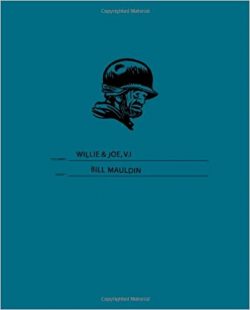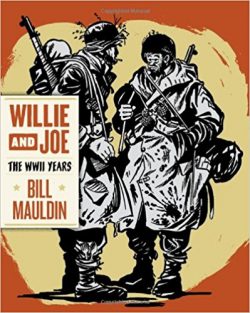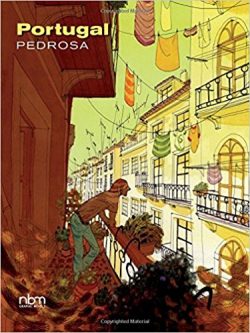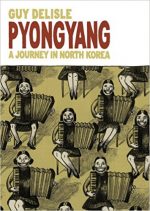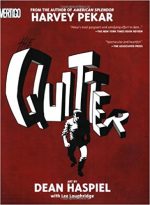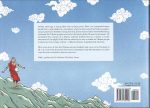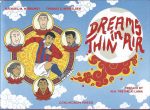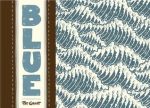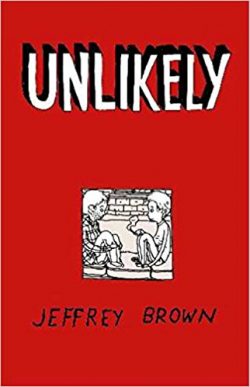
By Jeffrey Brown (Top Shelf Productions)
ISBN: 978-1-89183-041-4Â Â Â Â Â Â Â Â Â Â Â Â Â Â Â Â Â 978-1-89183-041-9
If you’re a fan of Jeffrey Brown’s cartoon exploits you might understandably admit to a small degree of confusion. In 2012 he scored his first global best-seller with a hilarious spin on the soft and nurturing side of the Jedi experience in Darth Vader and Son, following up with equally charming and hilarious sequels Vader’s Little Princess, Star Wars: Jedi Academy and others. He followed that up by contributing to the franchise’s dramatic comics canon with Star Wars Jedi Academy; Star Wars Jedi Academy: Return of the Padawan and Star Wars Jedi Academy: The Phantom Bully (2013-2015).
He has also directed music videos, created film posters, worked for public radio and co-written the feature film Save the Date.
Before that another Jeffrey Brown was the sharply sparkling wit who had crafted slyly satirical all-ages funny stuff for The Simpson’s Treehouse of Horror, Marvel’s Strange Tales, Incredible Change-Bots and similar visual venues.
There is yet another Jeffrey Brown: instigator and frequent star and stooge of such quirkily irresistible autobiographical Indy comics classics as Bighead, Little Things, Mome, Funny, Misshapen Body, Undeleted Scenes and the four-volume “Girlfriend Trilogy†(of which this is the second), comprising Clumsy, Unlikely, AEIOU and Every Girl is the End of the World for Me …
Whichever Brown’s your preferred choice, he’s a cartoonist of rare insight and unflinching integrity who still makes you laugh out loud when not prompting you to offer a big consoling hug…
Brown was raised in Michigan; relocating to Chicago in 2000 to attend the School of the Arts Institute and study painting. Before graduating he had switched to drawing comics and in 2002 Clumsy was released. A poignant and uncompromising dissection of a long-distance relationship, it quickly becoming a surprise hit with fans and critics alike.
A little later – and in the same vein – he produced Unlikely (or How I Lost My Virginity) – a True Love Story.
In both paperback and digital formats it describes a succession of painful torments, frustrations and moments of unparalleled joy as “250+ pages of young love, sex, drugs, heartbreak & comedy†involving the long and agonisingly extended process of “becoming a Man 
The material is both delicious and agonising in its forthright simplicity: a sequence of pictorial snippets and vignettes detailing how a meek, frumpy, horny, inoffensively average film-fan art-student – and long-overdue virgin – cautiously navigates his first fully-sexualised relationship with a girl.
As is always the case, his prospective partner comes with baggage that is at first beguiling and charming – or at least overlook-able – but which soon becomes a major sticking point. More telling, however, is what Jeffrey learns about himself in the process…
Every young man who’s gone gagging for it, gone for broke when the opportunity arose, and gone off to college or elsewhere to lick his amorous wounds has been through this, and for every inflammatory romance that makes it, there are a million that don’t…
Drawn in his deceptively effective Primitivist monochrome style with masterful staging, a sublime economy of phrase and a breathtaking gift for generating in equal amounts belly-laughs and those poignant lump-in-throat moments we’ve all experienced and regretted forever-after, this is a potent procession of crystallised moments which establish one awful truth. This is Not The One…
We’ve all been there, done that and then relentlessly reviewed and revised in our heads and wished we’d done it all differently…
Through dozens of individual episodes with titles like ‘Things of Mine She Still Has’, ‘I’d Do Her’, ‘No, This is Jeff’, ‘Virgin Alert’, ‘Talking and, Talking’, ‘All Nighter’, ‘I Had a Weird Dream’, ‘Will you Still’, ‘Sex’, ‘Sweetness Frustration’, and ‘The Last Time’: a web of triumphant relief, fractious accommodation and eventually, inevitably disappointment and fresh awareness for Jeff and Allisyn …
Brimming with portentous discovery, hopeful revelation and the shattering angst us oldsters can barely remember now let alone understand, Unlikely is a powerful delight for everybody who has confused raging hormones and intimate physical contact with love, and a sublime examination of what makes us human, hopeful and perhaps wistfully incorrigible…
© 2007 Jeffrey Brown.

